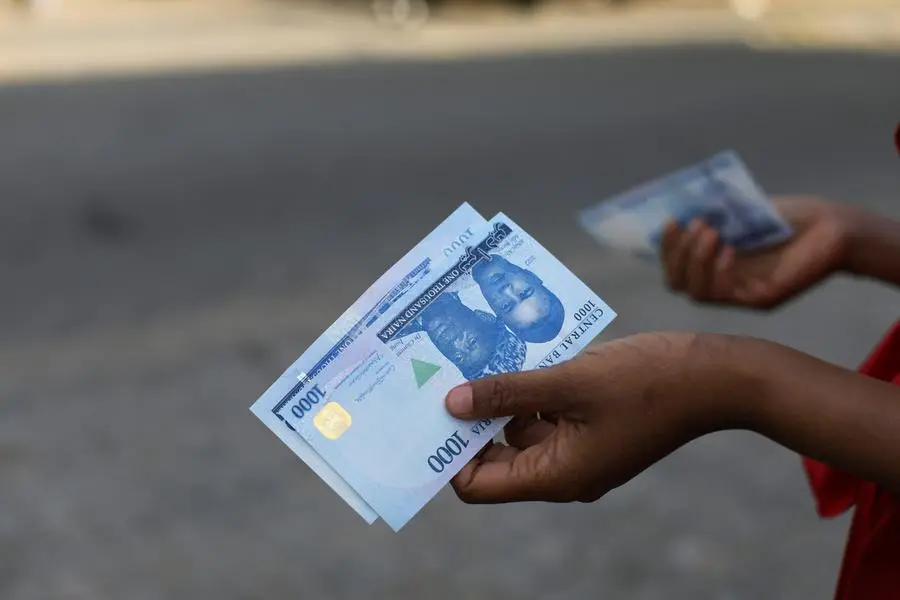PHOTO
Nigeria - Following the commencement on Monday, of the cash withdrawal limit directive of the Central Bank of Nigeria (CBN), Commercial Banks in the country have started dispensing newly redesigned naira notes through Automated Teller Machines (ATMs) nationwide.
Nigerian Tribune checks on a few commercial banks in Lagos indicated that the policy is now effective.
Already, banks have started sending out messages to their customers to ensure seamless compliance.
One of such messages read:” We are happy to inform you that the newly redesigned naira notes are now available at all UBA ATMs nationwide “Please note that the Maximum daily cash withdrawal limit for these notes at the ATMs is N100,000.”
A manager in one of the commercial banks in the Federal Capital Territory, Abuja told the Nigerian Tribune that his bank had no option than to implement the guidelines since the CBN has not issued contrary directive, maintaining that operations at his branch went well without any breach.
The manager who pleaded for anonymity on the grounds that he was not authorised to speak to the media said his branch in Area 11, Abuja complied fully with the CBN directive, and did not record any contravention on the first day as operations went on unhindered.
He stressed that his branch would continue to play according to the regulation, and advised bank customers to also comply with the CBN’s directive to ensure efficient service delivery.
According to him, all customers that transacted financial services business with his branch complied with the new cash withdrawal limits, except for two customers who attempted to withdraw above the limits possibly due to ignorance, but were corrected, and they did not raise any objection.
In December 2022, the CBN directed deposit money banks and other financial institutions to ensure that over-the-counter cash withdrawals by individuals and corporate entities per week do not exceed N100,000 and N500, 000, respectively.
However, due to the mixed reactions from Nigerians, the apex bank increased the maximum weekly limit for cash withdrawals across all channels by individuals and corporate organisations to N500,000 and N5 million respectively.
According to the CBN, the aim is to boost the cashless policy and reduce the amount of cash outside the banking system.
The apex banking sector regulator recently directed commercial banks in the country to load their ATMs with the redesigned naira notes in a bid to boost circulation, but up till this January, scarcity of the new notes lingered.
Reacting to the latest development, the Chief Executive Officer (CEO) of the Center for the Promotion of Private Enterprise, Dr Muda Yusuf said the vast majority of Nigerians are already doing cashless transactions; it’s a small minority of Nigerians using cash, especially in rural Nigeria, who should be left alone.
He said it will disrupt the economy of rural Nigeria, as it seems there is a gross underestimation of the rural economy.
Despite CBN’s assurances that those in the rural areas were would be taken care of through agent banking already in all local government areas, Yusuf said the cashless policy is not going to improve, but instead, slow down the economy, stressing that it is completely unnecessary because it will affect the velocity of transactions as the informal economy constitutes a large part of the economy.
He raised concerns with the policy, saying that the aim of the CBN for implementing the policy does not quite suffice because the cash in the system is just about six per cent of the money supply in the system.
“So, if you have just six per cent of cash outside the system, it means 94 per cent of the money in circulation is still within the banking system,” he said.Yusuf added that there is another measure of the adequacy of cash in an economy, which is called cash dominance in an economy, where you compare your cash to your Gross Domestic Product (GDP) because cash is needed to support the economy.
“Cash to GDP in Nigeria is 1.8 per cent, while cash to GDP in many advanced countries is between 5 and 10 per cent. Hence, when you relate the cash in the Nigerian economy to GDP, it is nothing to worry about,” he opined.
He also queried that people say 80 per cent of cash is outside the banking system, asking “where is it supposed to be?”
Copyright © 2022 Nigerian Tribune Provided by SyndiGate Media Inc. (Syndigate.info).




















